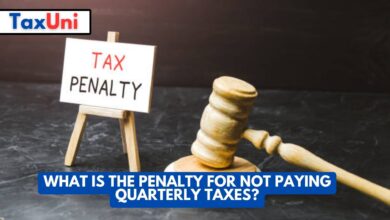Oklahoma State Taxes Guide
This article covers all essential information regarding Oklahoma state taxes, including personal income tax, sales tax, property tax, and business-related taxes like corporate income tax. It also explains tax filing requirements, important deadlines, and potential tax credits and deductions available to Oklahoma residents and businesses.

Contents
Oklahoma’s tax system includes several types of taxes that individuals and businesses are required to pay. Personal income tax in Oklahoma is based on a progressive rate structure, meaning higher earners pay a higher percentage of their income in taxes. Sales tax, often a significant source of state revenue, is applied to most goods and services purchased in the state. Oklahoma’s property taxes, though relatively low compared to national averages, fund essential local services such as schools and infrastructure. For businesses, the state levies corporate income tax, franchise tax, and various industry-specific taxes, depending on the nature of the company’s operations. Understanding Oklahoma’s tax system is critical for both residents and businesses, as it ensures compliance with state laws while maximizing potential savings through various tax credits, exemptions, and deductions.
Oklahoma Personal Income Tax
Oklahoma state income tax is structured progressively, meaning the tax rate increases as a taxpayer’s income rises. The tax applies to all income sources, including wages, salaries, and business income.
Tax Brackets
As of 2023, Oklahoma uses the following income tax brackets for single filers:
- 0.25% on income up to $1,000.
- 0.75% on income between $1,001 and $2,500.
- 1.75% on income between $2,501 and $3,750.
- 2.75% on income between $3,751 and $4,900.
- 3.75% on income between $4,901 and $7,200.
- 4.75% on income between $7,201 and $8,700.
- 4.85% on income over $8,700.
The tax brackets are slightly higher for married couples filing jointly, with the same marginal rates applied to higher income ranges.
Filing Requirements
Oklahoma residents are required to file a state income tax return if their gross income exceeds the filing thresholds, which generally align with federal filing requirements. Non-residents and part-year residents who earn income from Oklahoma sources, such as wages or rental income, are also required to file a state income tax return.
Oklahoma’s state income tax return is typically due by April 15, unless the federal filing deadline is extended. Returns can be filed online through the Oklahoma Taxpayer Access Point (OkTAP), which is the state’s online tax filing and payment system.

Oklahoma Sales Tax
Oklahoma imposes a sales tax on most retail purchases of goods and services. While the state’s base sales tax rate is 4.5%, local municipalities can add their own sales taxes, which means the total rate can vary significantly depending on where you shop.
Sales Tax Rates
The state’s base rate of 4.5% applies to most goods and services. However, local sales taxes can increase the total rate to over 8% in some areas. For example:
- Oklahoma City has a combined sales tax rate of approximately 8.625%.
- Tulsa has a total sales tax rate of 8.517%.
Sales tax in Oklahoma applies to most tangible goods and some services, such as repairs and maintenance. Certain items, like groceries, are subject to sales tax, though there are occasional tax holidays, such as the Back-to-School Sales Tax Holiday, which offers temporary exemptions on school-related items.
Filing Sales Tax
Businesses that sell taxable goods or services in Oklahoma are responsible for collecting sales tax and remitting it to the Oklahoma Tax Commission (OTC). Sales tax returns must typically be filed on a monthly basis, although smaller businesses may be eligible to file quarterly or annually, depending on their total sales volume.
Oklahoma Property Tax
Property taxes in Oklahoma are relatively low compared to national averages, but they remain an important source of revenue for local governments, funding schools, infrastructure, and other public services. Property taxes are based on the assessed value of real estate, which is typically a percentage of the property’s market value.
Assessment Process
In Oklahoma, property is assessed at 11% to 13.5% of its market value, depending on the type of property and its use. Local county assessors are responsible for determining the market value of properties each year.
Property Tax Rates
Property tax rates in Oklahoma vary by county and municipality, with tax rates often expressed as mills. One mill equals $1 in tax for every $1,000 of assessed value. Rates generally range between 50 to 100 mills, though they can vary widely based on local government needs.
Exemptions and Credits
Oklahoma offers several property tax exemptions and credits to reduce the tax burden on homeowners:
- Homestead Exemption: This provides a $1,000 reduction in the assessed value of a homeowner’s primary residence.
- Additional Homestead Exemption: Homeowners with low incomes may qualify for an additional $1,000 exemption.
- Senior Freeze: Homeowners over the age of 65 with limited income may be eligible to have their property’s assessed value frozen, preventing increases in property taxes due to rising market values.
Property taxes are due on January 1st each year and can be paid in installments to the local county treasurer.

Oklahoma Corporate Income Tax
Businesses operating in Oklahoma, especially C-corporations, are subject to the state’s corporate income tax. As of 2023, the corporate tax rate in Oklahoma is 4% on taxable income derived from activities in the state.
Corporate Tax Rate
- The 4% corporate income tax is applied to taxable income after deductions and credits.
- For companies that operate both in and outside of Oklahoma, income is apportioned based on the percentage of business activity that occurs within the state.
Filing Corporate Taxes
Corporate tax returns are generally due by the 15th day of the fourth month following the close of the corporation’s fiscal year. Businesses can file and pay their corporate taxes online through the OkTAP system.
Oklahoma Franchise Tax
In addition to corporate income tax, Oklahoma levies a franchise tax on certain businesses. The franchise tax applies to corporations with capital invested or used in Oklahoma.
Franchise Tax Rates
The franchise tax is $1.25 for every $1,000 of capital employed in the state, with a maximum annual tax of $20,000. The minimum franchise tax is $25, which is typically due from smaller businesses.
Corporations must file their franchise tax returns annually, and failure to file can result in penalties, including the suspension of business operations.
Special Industry Taxes in Oklahoma
Oklahoma’s economy is heavily influenced by the energy sector, and as such, the state imposes a variety of industry-specific taxes, particularly on oil and gas extraction.
- Oil and Gas Production Tax: Oklahoma levies a gross production tax on oil and natural gas extraction. The tax rate varies depending on the market price of oil and gas but typically ranges from 5% to 7%.
- Motor Fuel Taxes: Oklahoma also imposes taxes on motor fuels, including gasoline and diesel. The current tax rate is $0.20 per gallon for gasoline and $0.17 per gallon for diesel.

Tax Credits and Deductions in Oklahoma
Oklahoma offers various tax credits and deductions to help reduce tax liabilities for individuals and businesses. Some of the most popular tax credits include:
- Earned Income Tax Credit (EITC): Oklahoma offers a refundable state EITC for low-income individuals, which is a percentage of the federal EITC.
- Child and Dependent Care Credit: Taxpayers may claim a credit for expenses related to child and dependent care, which is based on the federal credit.
- Investment/New Jobs Credit: Businesses that invest in Oklahoma and create new jobs may be eligible for credits to offset their corporate income tax liabilities.
- Energy-Efficiency Credits: Oklahoma also provides credits for individuals and businesses that invest in renewable energy systems or energy-efficient upgrades.
How to File and Pay Taxes in Oklahoma?
Oklahoma offers a streamlined online system, OkTAP (Oklahoma Taxpayer Access Point), for filing and paying state taxes. Taxpayers can use this platform to:
- File state income, sales, and corporate tax returns.
- Pay taxes online via direct debit or credit card.
- Track the status of refunds and view tax account history.
The filing deadlines vary depending on the type of tax, with personal income tax returns due by April 15, while businesses may have different filing schedules depending on their tax obligations.





